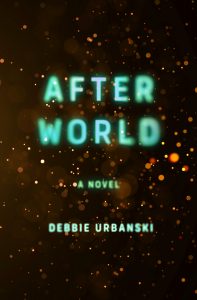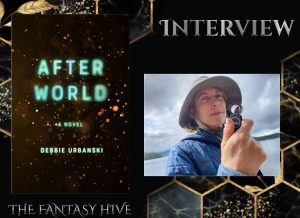Author Spotlight: Debbie Urbanski (AFTER WORLD)
Debbie Urbanski is the author of the novel After World (Simon & Schuster) and numerous speculative short stories and essays. Her writing has been published in F&SF, Interzone, Strange Horizons, The Year’s Best Fantasy & Science Fiction, Granta, The Best American Science Fiction and Fantasy, and Nature. She spends a lot of time trying to identify plants while hiking with her family in the hills of Upstate New York, and she’s looking forward to trekking across England on the Coast to Coast trail this summer.
Welcome to the Hive, Debbie. Let’s start with the basics: tell us about After World – why should readers check it out?
After World is an epistolary novel narrated by an AI, meaning my book uses a variety of forms (like chat transcripts, journal entries, a history textbook, a glossary of terms, charts, and even a recipe for a layered vegetable torte) to explore climate change, human extinction, technology, and the future. I really love post-apocalyptic novels but they always struck me as a little too fun and falsely heroic – would the apocalypse actually feel like a big adventure? I wrote After World because I wanted to create a post-apocalyptic book that felt more real to me. Despite my novel’s serious subject matter (i.e. the end of humanity), I’ve been told that After World, at times, can be very funny. I think it’s a great pick for an adventurous reader who is looking for something a little different. (Kirkus described my book as “certainly not for everyone” – but what good book is? They went on to call After World “wrenching, fascinating, and unique. A difficult but deeply moving story of grief and love,” which is one of my favorite descriptions.)
If you were transported to your own fictional world, how would you fare?
Not well at all! I have very few survivalist skills that would help me in an apocalyptic situation.
Tell us a little something about your writing process – do you have a certain method? Do you find music helps? Give us a glimpse into your world!
I write in my attic after my kids go off to school. I always wished I used a fountain pen and handwrote my drafts but I’m usually typing right into Scrivener, a great word processing program for writers. During the revision process, I still like to print everything out, lay the pages on the floor, and literally rip apart those pages (using the edge of a ruler) to rearrange the order. My attic has some great big windows looking out onto my tiny urban backyard where squirrels run and leap around this big old silver maple – they’re fun to watch when I need a break.
 Speaking of worlds, what inspires your worldbuilding? Do you have a magic system/s? If so, can you tell us a bit about it?
Speaking of worlds, what inspires your worldbuilding? Do you have a magic system/s? If so, can you tell us a bit about it?
I write both science fiction and fantasy. For my science fiction: I’m interested in near futures that are not ultra high-tech. I read a lot of nonfiction to inform my writing. For After World, I read books about climate change, species extinction, and AI. I also interacted with various Large Language Models and image generation models like GPT-3, GPT-4, DALL·E, and Midjourney. For fantasy: I’ve been fascinated by portals ever since I was a kid so portals tend to appear in many of my stories. With both sci-fi and fantasy, it’s important to me that my speculative worlds feel as realistic as possible. My background is literary fiction, so I treat my speculative worlds the same as I would have treated a realistic literary world, with as much detail and depth as I can.
What (or who) are your most significant fantasy/sci-fi influences? Are there any creators whom you dream of working with someday?
I still love the writers I grew up reading, like Ray Bradbury and Lloyd Alexander. Other favorite authors I discovered later in life are Ursula LeGuin, M.R. Carey, Margaret Atwood, Dexter Palmer, Jeff VanderMeer, Michel Faber, and Cormac McCarthy. I love reading and I don’t really restrict myself to any genres. In addition to fantasy and sci-fi, I like horror, literary fiction, historical fiction, mysteries, and classics, and I especially like work that combines genres (like Emma Newman’s After Atlas). I am so excited about the idea of someday writing a collaborative novel (with anyone really!). It sounds like such a fun and generative process.
We see such varying opinions from authors when it comes to the time of editing their books. How have you found the editing process? Enjoyable, stressful or satisfying?
I loved working with my editor Tim O’Connell at Simon & Schuster. The process was much more collaborative and generative than I had expected. Tim told me when we first met that “this is going to be fun” and he was right–it was fun. It was also an incredible amount of hard work and long days (and long weekends).
We always appreciate a beautiful book cover! How involved in the process were you? Was there a particular aesthetic you hoped they’d portray?
Simon & Schuster has amazing book designers. I loved all the cover options I was given though I did get to vote on my favorite (which turned out to be the favorite of my editorial team too). S&S seemed really open and welcoming to input though honestly I didn’t have any. The paperback for After World is coming out this fall so I recently got to see the cover options for that release: they were all awesome yet again. Both times I was open to anything the designers came up with–I figured they knew best what would work in a store setting.
Can you tell us a bit more about your characters? Do you have a favourite type of character you enjoy writing?
Mothers appear in a lot of my writing. (Sen, the last human on Earth in my novel, has three mothers actually!). I’m interested in exploring non-traditional experiences of motherhood. I like writing teenage girl characters too–partly because that’s the age my daughter is now, but I remember that time of my own life well as being full of strong emotions and crossroads and unspoken rules. I identify as an asexual (ace) writer and explore ace and aro (aromantic) identity in my work. In After World, Sen’s mothers are ace, and Sen is ace/aro.
The world shifts, and you find yourself with an extra day on your hands during which you’re not allowed to write. How do you choose to spend the day?
I would put on my hiking boots, fill my car with books, and drive 30 minutes south of where I live to Morgan Hill State Forest (which is actually where my novel takes place), and I would spend the day in Hemlock Hollow reading, hiking, and creek walking. It’s one of the prettiest and most peaceful places I know. I hope this actually happens soon–I can totally use a day like this.
One of our favourite questions here on the Fantasy Hive: which fantastical creature would you ride into battle and why?
I’m going to go traditional and timeless here and choose a dragon. Why? Because my teenage daughter has loved dragons forever and she’s always wanted to ride one. I’d love to give her that chance (I’d take her with me into battle – she’d be a good fighter too).
Tell us about a book you love. Any hidden gems?
The Wall by Marlen Haushoufer. It’s the slowest and most beautiful post-apocalyptic book I’ve ever read.
Can you tell us a little something about your current work(s) in progress? Have you any upcoming projects which you can share?
I just started exploring options for my second novel a few weeks ago. I’m still playing around with a few ideas, but my next book will hopefully involve some combination of the following: sperm whales; forests; ghosts; female friendships; haunted houses; menopause; matriarchal societies; non-human perspectives; and the Northern Atlantic Ocean.
Finally, what is the one thing you hope readers take away from your writing?
Maybe a little shift in how they look at the natural world. And perhaps curiosity about what a non-human-centered world would look like. A few readers of After World have commented on the amount and passion of my nature descriptions. This was such nice feedback because I honestly spent so much time crafting those descriptions. I wanted to describe nature how an AI might see it, with fresh eyes and interest and wonder at every detail. Someone recently told me that they don’t consider themselves a nature person but they appreciated getting to know a forest better from my book. That was my dream compliment.
Thank you so much for joining us today!
These were such fun questions – thank you!

